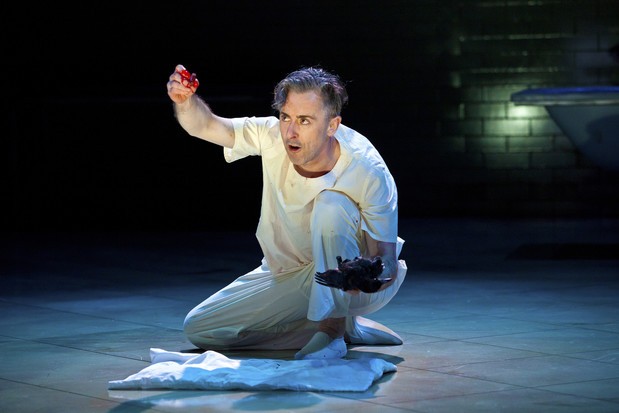
Alan Cumming gives a multifaceted whirlwind performance as an institutionalized man obsessed with Shakespeare’s Scottish play (photo by Jeremy Daniel)
Ethel Barrymore Theatre
243 West 47th St. between Broadway & Eighth Ave.
Thursday – Tuesday through July 14, $69.50 – $145
www.macbethonbroadway.com
As audience members arrive at the Barrymore Theatre to see the Scottish Play, they’re greeted by a warning on the outside doors: “The producers ask that you please refrain from speaking the name of the play you are about to see while inside these walls.” Once this fascinating, intense reimagination of William Shakespeare’s 1606 tale of bloodlust and blind ambition gets under way and star Alan Cumming says the name of the eponymous character out loud, there’s an audible hush in the theater, as if he’s broken the cardinal rule. For this is no ordinary Macbeth, and Cumming is no ordinary lead actor. Instead, he plays a deeply troubled man locked up in an asylum after some kind of tragic event. A doctor (Jenny Sterlin) and an orderly (Brendan Titley) set him up in his room and watch him carefully through a door and a window as he deals with his psychological crisis by getting lost inside Macbeth, speaking only lines from the play as guilt and fear envelop him. Directors John Tiffany (Once, Black Watch) and Andrew Goldberg (The Bomb-itty of Errors, Betwixt) have Cumming examine himself in a mirror, sit proudly on a chair like it’s a throne, huddle meekly under a stairway, and take a bath as he goes from Macbeth, Lady Macbeth, Banquo, and Macduff to the three witches, King Duncan, Fleance, and Malcolm. The stark, surreal goings-on are enhanced by Ian William Galloway’s surveillance cameras and video monitors and Fergus O’Hare’s powerful sound design, as loud noises echo through the patient’s head and across the theater. Cumming gives a tour-de-force performance as the man coming undone in one hundred breathtaking minutes, mixing in humor with tragedy as his breakdown continues. “There’s no art to find the mind’s construction in the face,” Duncan says in the first act. In this bold, daring take on the Bard’s classic story, there is plenty of art in the destruction of one mind’s haunted memory.